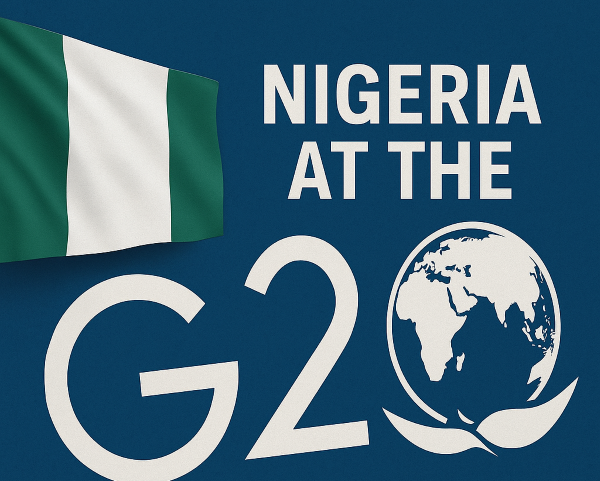
By Ayoola Ajanaku
For decades, Nigeria has styled itself as the “Giant of Africa” amongst the comity of nations. A country whose oil wealth, military might, and demographic scale gave it unmatched influence across the continent. From peacekeeping in Liberia and Sierra Leone to championing the fight against apartheid in South Africa, Nigeria once held a voice of authority in global forums. Today, however, that voice has grown faint to a large extent as flip-flops such as economic crises, insecurity at home, and policy missteps have weakened its stature. At the G20 Summit 2025, President Bola Ahmed Tinubu faces a rare opportunity to redefine Nigeria’s place in the world.
The stage in Johannesburg is not just another diplomatic gathering; it is a mirror reflecting how far Nigeria has slipped and how much it must recover. South Africa sits comfortably in the G20 and BRICS, Kenya is becoming the continent’s tech hub, and Egypt is assertive on diplomacy and trade. Nigeria, meanwhile, is struggling to hold onto its traditional role as Africa’s leader.
Against this backdrop, Tinubu’s performance at the G20 is more than symbolism. It may be the pivot point for Nigeria’s global reawakening.
From giant to question mark. In the late 20th century, Nigeria’s economy was a magnet for global investors, its oil revenue made it a regional heavyweight, and its diplomacy carried weight in both Africa and the wider world. Nigerian troops were the backbone of peacekeeping in West Africa. Abuja’s position on apartheid helped tilt global sentiment toward sanctions. The African Union and ECOWAS once looked to Nigeria for decisive leadership.
Today, the contrasts are stark. The Naira remains volatile despite the near stability status, debt service gulps up much of government revenue, and poverty levels have deepened. Armed insurgencies in the northeast, banditry in the northwest, and secessionist agitations in the southeast paint a picture of fragility. Even within West Africa, Nigeria’s sway has been tested by the recent wave of military coups, with ECOWAS responses faltering.
On the global stage, Nigeria has ceded ground. South Africa enjoys institutional privileges through BRICS and G20 membership. Kenya is gaining influence through its innovation-driven diplomacy, and Egypt has carved out space in Middle Eastern and African geopolitics. Nigeria, once the “indispensable” African nation, now faces questions: Can it still lead, or has it become too distracted by its internal struggles to command respect?
Despite its diminished status, Nigeria arrives at the G20 with an ambitious agenda, one that touches both domestic needs and global concerns. President Tinubu and his delegation must push forward an agenda that will deliver dividends to their citizens who are yearning for much-needed results.
Tinubu is expected to pursue bilateral deals, particularly in agriculture with Brazil, renewable energy with India, and digital economy opportunities with Western nations. Nigeria’s goal is to leverage the G20 to attract investments that align with Tinubu’s “Renewed Hope Agenda.”
These official talking points, however, will only carry weight if they are matched by a credible domestic story. The world is not just listening to Nigeria’s wish list; it is also watching whether the government has the discipline and stability to make them real. The much-touted fiscal reforms earlier by the PBAT administration still possess the facade of elite statistical consensus without the gains permeating to the lot at the bottom of the economic pyramid.
The touch points that President Tinubu must address at the G20 in 22-23 November 2025, are not just about reciting policy goals. It is about answering the hard questions: what is Nigeria’s value to the world, and why should anyone listen? To restore Nigeria’s voice, he must address several critical gaps. It’s a pity that Nigeria lacks diplomatic representation therein, as Ambassadors have not been posted offshore for the past two years and counting. This drawback has created a huge vacuum on the international stage for Nigeria, and if the comity of nations must take us seriously, this lacuna must be addressed at the speed of light.
In a nutshell, why it matters for all and sundry. Many Nigerians dismiss international summits as elite pageantry, far removed from daily struggles. Yet the G20 matters, as decisions on global taxation, debt relief, and climate financing affect whether Nigeria has fiscal space to fund schools and hospitals. Partnerships forged at the G20 can bring in agricultural technologies that boost food supply and lower prices. Tinubu’s performance abroad also influences investor confidence – (The jury is still out, though, on the RoI of his over forty-three trips abroad so far), which in turn shapes jobs, the Naira, and inflation.
In short, the G20 is not about handshakes on a stage; it is about whether policies abroad can ease the suffering at home. Nigerians will judge Tinubu not by the number of meetings he attends, but by whether life becomes more bearable after the summit. It’s not a sprint, though; it’s a marathon to address these HDI parameters across the board.
At this juncture, Nigeria stands at a crossroads as the G20 Summit offers President Tinubu a global stage to reclaim Nigeria’s fading mantle as Africa’s giant. To do so, he must speak with clarity, act with discipline, and deliver results beyond rhetoric.
The world has heard Nigeria’s boasts before; what it now demands is proof. If Tinubu rises to the occasion, Nigeria at the G20 could mark the beginning of Nigeria’s renewal. If he falls short, the summit may reinforce the perception that the once mighty giant is now just a shadow of itself – watched, but no longer heard.
Ayoola Ajanaku is a Communications and Advocacy Specialist based in Lagos, Nigeria…











